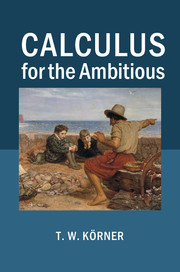Book contents
- Frontmatter
- Epigraph
- Contents
- Introduction
- 1 Preliminary ideas
- 2 The integral
- 3 Functions, old and new
- 4 Falling bodies
- 5 Compound interest and horse kicks
- 6 Taylor's theorem
- 7 Approximations, good and bad
- 8 Hills and dales
- 9 Differential equations via computers
- 10 Paradise lost
- 11 Paradise regained
- Further reading
- Index
11 - Paradise regained
Published online by Cambridge University Press: 05 June 2014
- Frontmatter
- Epigraph
- Contents
- Introduction
- 1 Preliminary ideas
- 2 The integral
- 3 Functions, old and new
- 4 Falling bodies
- 5 Compound interest and horse kicks
- 6 Taylor's theorem
- 7 Approximations, good and bad
- 8 Hills and dales
- 9 Differential equations via computers
- 10 Paradise lost
- 11 Paradise regained
- Further reading
- Index
Summary
A short pep talk
The calculus, as presented in this book, is a collection of methods whose justification depends on appeals to intuition. As we saw in the previous chapter, this causes serious problems when we attempt to push these methods past a certain point. It is part of the mathematician's ethos to push methods as far as they will go, so it is important to reconstruct calculus without any appeals to intuition.
Fortunately, the nineteenth-century reformers were able to perform the reconstruction in such a way as to retain the main methods and results of the old calculus. Sometimes, people claim that, since the reconstruction was so successful, it must have been unnecessary. However, mathematicians like Gauss, Cauchy, Dirichlet and Weierstrass did not reconstruct analysis with a view to the past, but with a view to the future. The questions they wished to ask and the methods they wished to use are simply inexpressible in the language of the old calculus.
Before starting the reconstruction, the reader should place this book on the nursery shelf next to The Very Hungry Caterpillar and My First Counting Book, since any attempt to mix the ‘old calculus’ with the ‘new analysis’ is likely to be disastrous for the reasons explained by Abel in another letter to Halsteen.
- Type
- Chapter
- Information
- Calculus for the Ambitious , pp. 151 - 162Publisher: Cambridge University PressPrint publication year: 2014



